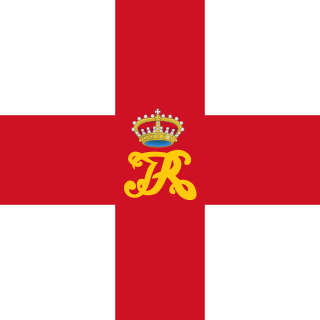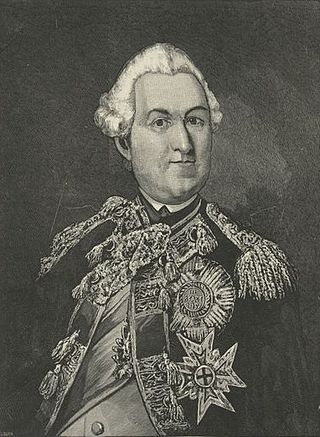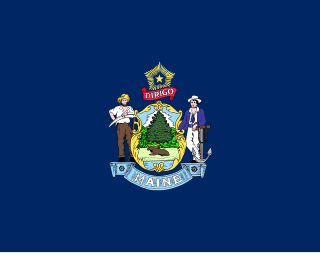
York County is the southwesternmost county in the U.S. state of Maine, along the state of New Hampshire's eastern border. It is divided from Strafford County, New Hampshire, by the Salmon Falls River, and the connected tidal estuary—the Piscataqua River. York County was permanently established in 1639. It is the state's oldest county and one of the oldest in the United States. Several of Maine's earliest colonial settlements are found in the county. As of the 2020 census, its population was 211,972, making it Maine's second-most populous county. Its county seat is Alfred. York County is part of the Portland–South Portland, Maine Metropolitan Statistical Area.

The Massachusetts Bay Colony, more formally the Colony of Massachusetts Bay, was an English settlement on the east coast of North America around the Massachusetts Bay, the northernmost of the several colonies later reorganized as the Province of Massachusetts Bay. The lands of the settlement were in southern New England, with initial settlements on two natural harbors and surrounding land about 15.4 miles (24.8 km) apart—the areas around Salem and Boston, north of the previously established Plymouth Colony. The territory nominally administered by the Massachusetts Bay Colony covered much of central New England, including portions of Massachusetts, Maine, New Hampshire, and Connecticut.

Sir Ferdinando Gorges was a naval and military commander and governor of the important port of Plymouth in England. He was involved in Essex's Rebellion against the Queen, but escaped punishment by testifying against the main conspirators. His early involvement in English trade with and settlement of North America as well as his efforts in founding the Province of Maine in 1622 earned him the title of the "Father of English Colonization in North America," even though Gorges himself never set foot in the New World.

The Province of New Hampshire was a colony of England and later a British province in New England. The name was first given in 1629 to the territory between the Merrimack and Piscataqua rivers on the eastern coast of North America, and was named after the county of Hampshire in southern England by Captain John Mason, its first named proprietor. In 1776 the province established an independent state and government, the State of New Hampshire, and joined with twelve other colonies to form the United States.

The Province of Maine refers to any of the various English colonies established in the 17th century along the northeast coast of North America, within portions of the present-day U.S. states of Maine, New Hampshire, and Vermont, and the Canadian provinces of Quebec and New Brunswick. It existed through a series of land patents made by the kings of England during this era, and included New Somersetshire, Lygonia, and Falmouth. The province was incorporated into the Massachusetts Bay Colony during the 1650s, beginning with the formation of York County, Massachusetts, which extended from the Piscataqua River to just east of the mouth of the Presumpscot River in Casco Bay. Eventually, its territory grew to encompass nearly all of present-day Maine.

Joseph Dudley was a colonial administrator, a native of Roxbury in Massachusetts Bay Colony, and the son of one of its founders. He had a leading role in the administration of the Dominion of New England (1686–1689) which was overthrown in the 1689 Boston revolt. He served briefly on the council of the Province of New York where he oversaw the trial which convicted Jacob Leisler, the ringleader of Leisler's Rebellion. He then spent eight years in England in the 1690s as Lieutenant-Governor of the Isle of Wight, including one year as a Member of Parliament for Newtown. In 1702, he returned to New England after being appointed governor of the Province of Massachusetts Bay and Province of New Hampshire, posts that he held until 1715.

The Dominion of New England in America (1686–1689) was an administrative union of English colonies covering all of New England and the Mid-Atlantic Colonies, with the exception of the Delaware Colony and the Province of Pennsylvania. The region's political structure was one of centralized control similar to the model used by the Spanish monarchy under the Viceroyalty of New Spain. The dominion was unacceptable to most colonists because they deeply resented being stripped of their rights and having their colonial charters revoked. Governor Edmund Andros tried to make legal and structural changes, but most of these were undone and the Dominion was overthrown as soon as word was received that King James II had left the throne in England. One notable change was the forced introduction of the Church of England into Massachusetts, whose Puritan leaders had previously refused to allow it any sort of foothold.
The District of Maine was the governmental designation for what is now the U.S. state of Maine from October 25, 1780 to March 15, 1820, when it was admitted to the Union as the 23rd state. The district was a part of the Commonwealth of Massachusetts and before American independence had been part of the British province of Massachusetts Bay.
Samuel Penhallow was a Cornish colonist and historian and militia leader in present-day Maine during Queen Anne's War and Father Rale's War. He was the commander at Fort Menaskoux and was attacked during the Northeast Coast Campaign (1724).
Cornwall County was a county of the former Province of New York, established on September 5, 1665 from 25,100 square miles (65,000 km2) of land that had been granted to the Duke of York in modern Maine. As established, the grant ran all the way from the St. Lawrence River to the Atlantic Ocean, between the Kennebec and St. Croix rivers, and produced what today is most of Aroostook, Piscataquis, Washington, Hancock, Penobscot, Waldo, Knox, Lincoln, Kennebec, Somerset, and Sagadahoc counties.

A proprietary colony was a type of English colony mostly in North America and in the Caribbean in the 17th century. In the British Empire, all land belonged to the monarch, and it was his/her prerogative to divide. Therefore, all colonial properties were partitioned by royal charter into one of four types: proprietary, royal, joint stock, or covenant. Under the proprietary system, individuals or companies were granted commercial charters by the monarchs of the Kingdom of England to establish colonies. These proprietors then selected the governors and other officials in the colony.

Richard Coote, 1st Earl of Bellomont, known as The Lord Coote between 1683–89, was an Irish nobleman and colonial administrator who represented Droitwich in the English Parliament from 1688 to 1695. He was a prominent Williamite, supporting William III and Mary II during the Glorious Revolution.
New Hampshire is a state in the New England region of the northeastern United States. During the American Revolution, it was one of the Thirteen Colonies that revolted against British rule. One of the smallest U.S. states in area and population, it was part of New England's textile economy between the American Civil War and World War II. Since the 20th century, the state has been known for its presidential primary, outdoor recreation, its educational boarding schools, and being part of the biotech industry.
Samuel Maverick was one of the first colonists to settle in the Massachusetts Bay Colony. Arriving ahead of the Winthrop Fleet, Maverick became one of the earliest settlers, one of the largest landowners and one of the first slave-owners in Massachusetts. He signed his name as "Mavericke". He is the ancestor of rancher Samuel Maverick, from whom the term maverick for "independently minded" and an unbranded animal derives.
Samuel Shute was an English military officer and royal governor of the provinces of Massachusetts and New Hampshire. After serving in the Nine Years' War and the War of the Spanish Succession, he was appointed by King George I as governor of Massachusetts and New Hampshire in 1716. His tenure was marked by virulent disagreements with the Massachusetts assembly on a variety of issues, and by poorly conducted diplomacy with respect to the Native American Wabanaki Confederacy of northern New England that led to Dummer's War (1722–1725).

Capt. Christopher Levett was an English writer, explorer and naval captain, born at York, England. He explored the coast of New England and secured a grant from the king to settle present-day Portland, Maine, the first European to do so. Levett left behind a group of settlers at his Maine plantation in Casco Bay, but they were never heard from again. Their fate is unknown. As a member of the Plymouth Council for New England, Levett was named the Governor of Plymouth in 1623 and a close adviser to Capt. Robert Gorges in his attempt to found an early English colony at Weymouth, Massachusetts, which also failed. Levett was also named an early governor of Virginia in 1628, according to Parliamentary records at Whitehall.

The following outline is provided as an overview of and topical guide to the U.S. state of Maine:
Walter Barefoote was colonist and deputy governor of the Province of New Hampshire. From 1685 to 1686 he served as acting governor of the province.










